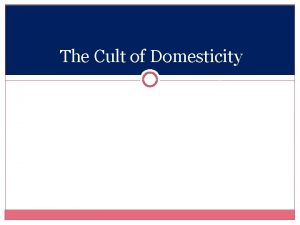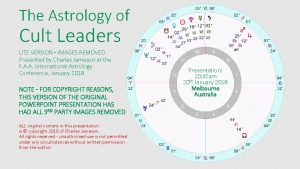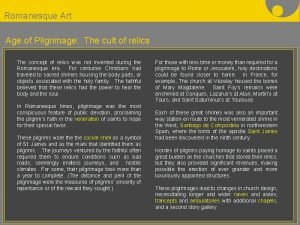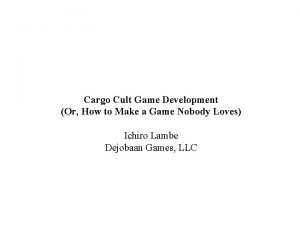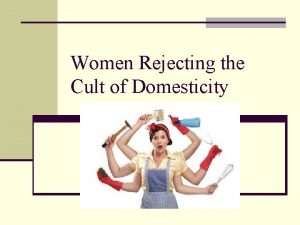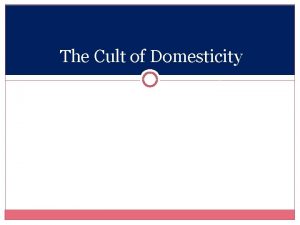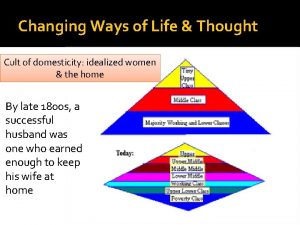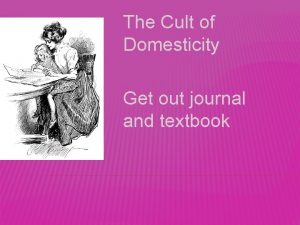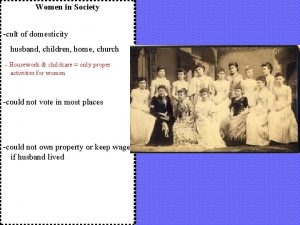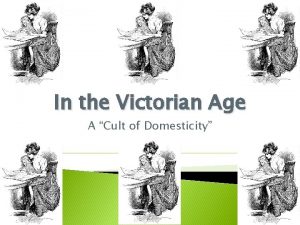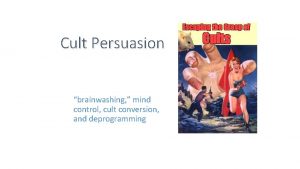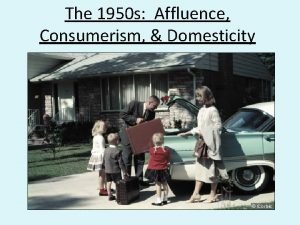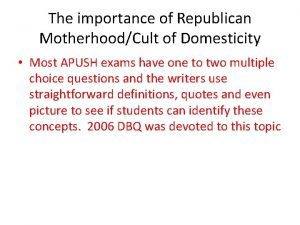National Humanities Center The Cult of Domesticity A
























- Slides: 24

National Humanities Center The Cult of Domesticity A live, online professional development seminar

Framing Questions 1. How are the four cardinal virtues of “The Cult of True Womanhood” --piety, purity, submissiveness, and domesticity--either exhibited, challenged, or both in our readings on domesticity? 2. What are some of the potential political and economic consequences of encouraging women to restrict themselves to the “domestic sphere” of home and hearth? 3. How do you respond to the argument that domesticity was a fair price that women paid for security in mid-nineteenth century America? What would enter into a true “cost analysis” of the benefits and risks?

Lucinda Mac. Kethan Professor Emerita of English North Carolina State University National Humanities Center Fellow 1984 -85 Southern Literature and American Literature Daughters of Time: Creating Woman's Voice in Southern Story (1990) The Dream of Arcady: Place and Time in Southern Literature (1980) A Guide to Scribbling Women. A Multi -Media Presentation of American Women's Short Stories (with James A. Miller) (1997)

Cult of Domesticity was among the virtues most prized by women’s magazines. . Sacred Scripture re-enforced social pressure. "St. Paul knew what was best for women when he advised them to be domestic, " said Mrs. Sandford. "There is composure at home; there is something sedative in the duties which home involves. It affords security not only from the world, but from delusions and higher education, political rights. . . A thousand expert voices applauded their femininity, their adjustment, errors of every kind. “ “Columns, books and articles by experts [told] women their role was to seek fulfillment as wives and mothers. . They were taught to pity the neurotic, unfeminine, unhappy women who wanted to be poets or physicists or presidents. They learned that truly feminine women do not want careers, their new maturity. All they had to do was devote their lives from earliest girlhood to finding a husband bearing children. ” When was this quotation written?

The Sphere of Women Full page engraved illustration for an article from Godey's Lady's Book, Vol. 40 (March 1850): P. 209 (Philadelphia: Published by L. A. Godey). Caption: "Translated from the German of Goethe. " Clifton Waller Barrett Collection, University of Virginia.

Barbara Welter, "The Cult of True Womanhood: 1820 -1860" (1966). . Woman, in the cult of True Womanhood presented by the women’s magazines, gift annuals, and religious literature of the nineteenth century, was the hostage in the home. In a society where values changed frequently, where fortunes rose and fell with frightening rapidity, where social and economic mobility provided instability as well as hope, one thing at least remained the same a true woman was a true woman, wherever she was found. If anyone, male or female, dared to tamper with the complex of virtues that made up True Womanhood, he was damned immediately as the enemy of God, of civilization, and of the Republic. It was the fearful obligation, a solemn responsibility, which the nineteenth-century American woman had - to uphold the pillars of the temple with her frail white hand. The attributes of True Womanhood, by which a woman judged herself and was judged by her husband, her neighbors, and her society could be divided into four cardinal virtues - piety, purity, submissiveness, and domesticity. . . Without them. . all was ashes. With them she was promised happiness and power.

Barbara Welter, "The Cult of True Womanhood: 1820 -1860" (1966) Woman understood her position if she was the right kind of woman, a true woman. . . Put strongly by Mrs. Sandford: "A really sensible woman feels her dependence. She does what she can, but she is conscious of her inferiority, and therefore grateful for support. . " "True feminine genius, " said Grace Greenwood, "is ever timid, doubtful, and clingingly dependent; a perpetual childhood. . . " Thus, "if [your husband] is abusive, never retort. " A Young Woman’s Guide to the Harmonious Development of a Christian Character suggested that females should "become as little children" and avoid "a controversial spirit. . . " Without comment or criticism the writer affirms that "to suffer and be silent under suffering seems to be the great command a woman has to obey. . . "

Treatise on Domestic Economy (Boston: T. H. Webb, & Co. 1842) Catharine E. Beecher But, in order that each individual may pursue and secure the highest degree of happiness within his reach, unimpeded by the selfish interests of others, a system of laws must be established, which sustain certain relations and dependencies in social and civil life. What these relations and their attending obligations shall be, are to be determined, not with reference to the wishes and interests of a few, but solely with reference to the general good of all; so that each individual shall have his own interest, as well as the public benefit, secured by them. For this purpose, it is needful that certain relations be sustained, which involve the duties of subordination. There must be the magistrate and the subject, one of whom is the superior, and the other the inferior. There must be the relations of husband wife, parent and child, teacher and pupil, employer and employed, each involving the relative duties of subordination. The superior, in certain particulars, is to direct, and the inferior is to yield obedience. Society could never go forward, harmoniously, nor could any craft or profession be successfully pursued, unless these superior and subordinate relations be instituted and sustained.

Treatise on Domestic Economy (Boston: T. H. Webb, & Co. 1842) Catharine E. Beecher But who shall take the higher, and who the subordinate, stations in social and. civil life? This matter, in the case of parents and children, is decided by the Creator. He has given children to the control of parents, as their superiors, and to them they remain subordinate, to a certain age, or so long as they are members of their household. And parents can delegate such a portion of their authority to teachers and employers, as the interests of their children require. In most other cases, in a truly democratic state, each individual is allowed to choose for himself, who shall take the position of his superior. No woman is forced to obey any husband but the one she chooses for herself; nor is she obliged to take a husband, if she prefers to remain single. So every domestic, and every artisan or laborer, after passing from parental control, can choose the employer to whom he is to accord obedience, or, if he prefers to relinquish certain advantages, he can remain without taking a subordinate place to any employer….

Treatise on Domestic Economy (Boston: T. H. Webb, & Co. 1842) Catharine E. Beecher The tendencies of democratic institutions, in reference to the rights and interests of the female sex, have been fully developed in the United States; and it is in this aspect, that the subject is one of peculiar interest to American women. In this Country, it is established, both by opinion and by practice, that woman has an equal interest in all social and civil concerns; and that no domestic, civil, or political, institution, is right, which sacrifices her interest to promote that of the other sex. But in order to secure her the more firmly in all these privileges, it is decided, that, in the domestic relation, she take a subordinate station, and that, in civil and political concerns, her interests be entrusted to the other sex, without her taking any part in voting, or in making and administering laws.

Fanny Fern (Sarah Anne Parton), Fern Leaves from Fanny's Portfolio, series one (Auburn: Derby & Miller, 1853) HOW HUSBANDS MAY RULE. "Dear Mary, " said Harry ---- to his little wife, "I have a favor to ask of you. You have a friend whom I dislike very much, and who I am quite sure will make trouble between us. Will you give up Mrs. May for my sake, Mary? “ A slight shade of vexation crossed Mary's pretty face, as she said, "You are unreasonable, Harry. She is lady-like, refined, intellectual, and fascinating, is she not? “ "Yes, all of that; and, for that very reason, her influence over one so yielding and impulsive as yourself is more to be dreaded, if unfavorable. I'm quite in earnest, Mary. I could wish never to see you together again. ” "Pshaw! dear Harry, that's going too far. Don't be disagreeable; let us talk of something else. As old Uncle Jeff says, 'How's trade? '" and she looked archly in his face. Harry didn’t smile.

Fanny Fern (Sarah Anne Parton), Fern Leaves from Fanny's Portfolio, HOW HUSBANDS MAY RULE. (cont’d) "Well, " said the little wife, turning away, and patting her foot nervously, "I don't see how I can break with her, Harry, for a whim of yours; besides, I've promised to go there this very evening. “ Harry made no reply, and in a few moments was on his way to his office. Mary stood behind the curtain, and looked after him as he went down the street. There was an uncomfortable, stifling sensation in her throat, and something very like a tear glittering in her eye. Harry was vexed, --she was sure of that. . And so she wandered, restless and unhappy, into her little sleeping-room. . . Turn where she would, some proof of his devotion met her eye. But Mrs. May! She was so smart and satirical! She would make so much sport of her, for being "ruled" so by Harry!. . No, no, it wouldn't do for her to yield. .

Fanny Fern (Sarah Anne Parton), Fern Leaves from Fanny's Portfolio, HOW HUSBANDS MAY RULE. (cont’d) Yes, she would go; she had quite made up her mind to that. Then she opened her jewel-case; a little note fell at her feet. She knew the contents very well. It was from Harry, --slipped slyly into her hand on her birthday, with that pretty bracelet. It couldn't do any harm to read it again. It was very lover-like for a year old husband; but she liked it!. . Perhaps, after all, Harry was right about Mrs. May; and if he wasn't, one hair of his head was worth more to her than all the women in the world. He had never said one unkind word to her, --never! He had anticipated every wish. He had been so attentive and solicitous when she was ill. How could she grieve him? Love conquered! The pretty robe was folded away, the jewels returned to their case, and, with a light heart, Mary sat down to await her husband's return. . "God bless you, Mary? " said the happy husband; "you've saved me from a keen sorrow!“ Dear reader, --won't you tell? --there are some husbands worth all the sacrifices a loving heart can make!

INCIDENTS IN THE LIFE OF A SLAVE GIRL Harriet Jacobs When my master said he was going to build a house for me, and that he could do it with little trouble and expense, I was in hopes something would happen to frustrate his scheme; but I soon heard that the house was actually begun. I vowed before my Maker that I would never enter it. I had rather toil on the plantation from dawn till dark; I had rather live and die in jail, than drag on, from day to day, through such a living death. I was determined that the master, whom I so hated and loathed, who had blighted the prospects of my youth, and made my life a desert, should not, after my long struggle with him, succeed at last in trampling his victim under his feet. I would do any thing, every thing, for the sake of defeating him. What could I do? I thought and thought, till I became desperate, and made a plunge into the abyss. And now, reader, I come to a period in my unhappy life, which I would gladly forget if I could. The remembrance fills me with sorrow and shame. It pains me to tell you of it; but I have promised to tell you the truth, and I will do it honestly, let it cost me what it may. I will not try to screen myself behind the plea of compulsion from a master; for it was not so. Neither can I plead ignorance or thoughtlessness. For years, my master had done his utmost to pollute my mind with foul images, and to destroy the pure principles inculcated by my grandmother, and the good mistress of my childhood. The influences of slavery had the same effect on me that they had on other young girls; they had made me prematurely knowing, concerning the evil ways of the world. I know what I did, and I did it with deliberate calculation.

INCIDENTS IN THE LIFE OF A SLAVE GIRL Harriet Jacobs But, O, ye happy women, whose purity has been sheltered from childhood, who have been free to choose the objects of your affection, whose homes are protected by law, do not judge the poor desolate slave girl too severely! If slavery had been abolished, I, also, could have married the man of my choice; I could have had a home shielded by the laws; and I should have been spared the painful task of confessing what I am now about to relate; but all my prospects had been blighted by slavery. I wanted to keep myself pure; and, under the most adverse circumstances, I tried hard to preserve my self-respect; but I was struggling alone in the powerful grasp of the demon Slavery; and the monster proved too strong for me. I felt as if I was forsaken by God and man; as if all my efforts must be frustrated; and I became reckless in my despair. I have told you that Dr. Flint's persecutions and his wife's jealousy had given rise to some gossip in the neighborhood. Among others, it chanced that a white unmarried gentleman had obtained some knowledge of the circumstances in which I was placed. He knew my grandmother, and often spoke to me in the street. He became interested for me, and asked questions about my master, which I answered in part. He expressed a great deal of sympathy, and a wish to aid me. He constantly sought opportunities to see me, and wrote to me frequently. I was a poor slave girl, only fifteen years old.

INCIDENTS IN THE LIFE OF A SLAVE GIRL Harriet Jacobs So much attention from a superior person was, of course, flattering; for human nature is the same in all. I also felt grateful for his sympathy, and encouraged by his kind words. It seemed to me a great thing to have such a friend. By degrees, a more tender feeling crept into my heart. He was an educated and eloquent gentleman; too eloquent, alas, for the poor slave girl who trusted in him. Of course I saw whither all this was tending. I knew the impassable gulf between us; but to be an object of interest to a man who is not married, and who is not her master, is agreeable to the pride and feelings of a slave, if her miserable situation has left her any pride or sentiment. It seems less degrading to give one's self, than to submit to compulsion. There is something akin to freedom in having a lover who has no control over you, except that which he gains by kindness and attachment. A master may treat you as rudely as he pleases, and you dare not speak; moreover, the wrong does not seem so great with an unmarried man, as with one who has a wife to be made unhappy. There may be sophistry in all this; but the condition of a slave confuses all principles of morality, and, in fact, renders the practice of them impossible.

INCIDENTS IN THE LIFE OF A SLAVE GIRL Harriet Jacobs When I found that my master had actually begun to build the lonely cottage, other feelings mixed with those I have described. Revenge, and calculations of interest, were added to flattered vanity and sincere gratitude for kindness. I knew nothing would enrage Dr. Flint so much as to know that I favored another; and it was something to triumph over my tyrant even in that small way. I thought he would revenge himself by selling me, and I was sure my friend, Mr. Sands, would buy me. He was a man of more generosity and feeling than my master, and I thought my freedom could be easily obtained from him. The crisis of my fate now came so near that I was desperate. I shuddered to think of being the mother of children that should be owned by my old tyrant. I knew that as soon as a new fancy took him, his victims were sold far off to get rid of them; especially if they had children. I had seen several women sold, with his babies at the breast. He never allowed his offspring by slaves to remain long in sight of himself and his wife. Of a man who was not my master I could ask to have my children well supported; and in this case, I felt confident I should obtain the boon. I also felt quite sure that they would be made free. With all these thoughts revolving in my mind, and seeing no other way of escaping the doom I so much dreaded, I made a headlong plunge. Pity me, and pardon me, O virtuous reader! You never knew what it is to be a slave; to be entirely unprotected by law or custom; to have the laws reduce you to the condition of a chattel, entirely subject to the will of another. You never exhausted your ingenuity in avoiding the snares, and eluding the power of a hated tyrant; you never shuddered at the sound of his footsteps, and trembled within hearing of his voice. I know I did wrong. No one can feel it more sensibly than I do. The painful and humiliating memory will haunt me to my dying day. Still, in looking back, calmly, on the events of my life, I feel that the slave woman ought not to be judged by the same standard as others.

Uncle Tom’s Cabin, or Life Among the Lowly CHAPTER IX In Which It Appears That a Senator Is But a Man The light of the cheerful fire shone on the rug and carpet of a cosey parlor, and glittered on the sides of the tea-cups and well-brightened tea-pot, as Senator Bird was drawing off his boots, preparatory to inserting his feet in a pair of new handsome slippers, which his wife had been working for him while away on his senatorial tour. Mrs. Bird, looking the very picture of delight, was superintending the arrangements of the table, ever and anon mingling admonitory remarks to a number of frolicsome juveniles, who were effervescing in all those modes of untold gambol and mischief that have astonished mothers ever since the flood. "Tom, let the door-knob alone, -- there's a man! Mary! don't pull the cat's tail, -- poor pussy! Jim, you mustn't climb on that table, -- no, no! -- You don't know, my dear, what a surprise it is to us all, to see you here to-night!" said she, at last, when she found a space to say something to her husband. "Yes, yes, I thought I'd just make a run down, spend the night, and have a little comfort at home. I'm tired to death, and my head aches!“ Mrs. Bird cast a glance at a camphor-bottle, which stood in the half-open closet, and appeared to meditate an approach to it, but her husband interposed.

"No, no, Mary, no doctoring! a cup of your good hot tea, and some of our good home living, is what I want. It's a tiresome business, this legislating!" And the senator smiled, as if he rather liked the idea of considering himself a sacrifice to his country. "Well, " said his wife, after the business of the teatable was getting rather slack, "and what have they been doing in the Senate? “ Now, it was a very unusual thing for gentle little Mrs. Bird ever to trouble her head with what was going on in the house of the state, very wisely considering that she had enough to do to mind her own. Mr. Bird, therefore, opened his eyes in surprise, and said, "Not very much of importance. “ "Well; but is it true that they have been passing a law forbidding people to give meat and drink to those poor colored folks that come along? I heard they were talking of some such law, but I didn't think any Christian legislature would pass it!" "Why, Mary, you are getting to be a politician, all at once. “ "No, nonsense! I wouldn't give a fip for all your politics, generally, but I think this is something downright cruel and unchristian. I hope, my dear, no such law has been passed. “ "There has been a law passed forbidding people to help off the slaves that come over from Kentucky, my dear; so much of that thing has been done by these reckless Abolitionists, that our brethren in Kentucky are very strongly excited, and it seems necessary, and no more than Christian and kind, that something should be done by our state to quiet the excitement. "

"And what is the law? It don't forbid us to shelter those poor creatures a night, does it, and to give 'em something comfortable to eat, and a few old clothes, and send them quietly about their business? “ "Why, yes, my dear; that would be aiding and abetting, you know. “ Mrs. Bird was a timid, blushing little woman, of about four feet in height, and with mild blue eyes, and a peach-blow complexion, and the gentlest, sweetest voice in the world; -- as for courage, a moderate-sized cock-turkey had been known to put her to rout at the very first gobble, and a stout house-dog, of moderate capacity, would bring her into subjection merely by a show of his teeth. Her husband children were her entire world, and in these she ruled more by entreaty and persuasion than by command or argument. There was only one thing that was capable of arousing her, and that provocation came in on the side of her unusually gentle and sympathetic nature; -- anything in the shape of cruelty would throw her into a passion, which was the more alarming and inexplicable in proportion to the general softness of her nature. . On the present occasion, Mrs. Bird rose quickly, with very red cheeks, which quite improved her general appearance, and walked up to her husband, with quite a resolute air, and said, in a determined tone, "Now, John, I want to know if you think such a law as that is right and Christian? " "You won't shoot me, now, Mary, if I say I do!“ "I never could have thought it of you, John; you didn't vote for it? " "Even so, my fair politician. "

"You ought to be ashamed, John! Poor, homeless, houseless creatures! It's a shameful, wicked, abominable law, and I'll break it, for one, the first time I get a chance; and I hope I shall have a chance, I do! Things have got to a pretty pass, if a woman can't give a warm supper and a bed to poor, starving creatures, just because they are slaves, and have been abused and oppressed all their lives, poor things!“ "But, Mary, just listen to me. Your feelings are all quite right, dear, and interesting, and I love you for them; but, then, dear, we mustn't suffer our feelings to run away with our judgment; you must consider it's a matter of private feeling, -- there are great public interests involved, -- there is such a state of public agitation rising, that we must put aside our private feelings. “ "Now, John, I don't know anything about politics, but I can read my Bible; and there I see that I must feed the hungry, clothe naked, and comfort the desolate; and that Bible I mean to follow. “ "But in cases where your doing so would involve a great public evil -- “ "Obeying God never brings on public evils. I know it can't. It's always safest, all round, to do as He bids us. "Now, listen to me, Mary, and I can state to you a very clear argument, to show -- “ "O, nonsense, John! -- you can talk all night, but you wouldn't do it. I put it to you, John, -- would you now turn away a poor, shivering, hungry creature from your door, because he was a runaway? Would you, now? "

Now, if the truth must be told, our senator had the misfortune to be a man who had a particularly humane and accessible nature, and turning away anybody that was in trouble never had been his forte; and what was worse for him in this particular pinch of the argument was, that his wife knew it, and, of course was making an assault on rather an indefensible point. So he had recourse to the usual means of gaining time for such cases made and provided; he said "ahem, " and coughed several times, took out his pocket-handkerchief, and began to wipe his glasses. Mrs. Bird, seeing the defenceless condition of the enemy's territory, had no more conscience than to push her advantage. "I should like to see you doing that, John -- I really should! Turning a woman out of doors in a snowstorm, for instance; or may be you'd take her up and put her in jail, wouldn't you? You would make a great hand at that!"

“What Soft Cherubic Creatures” Emily Dickinson What Soft -- Cherubic Creatures – These Gentlewomen are – One would as soon assault a Plush – Or violate a Star – Such Dimity Convictions – A Horror so refined Of freckled Human Nature – Of Deity -- ashamed – It's such a common -- Glory – A Fisherman's -- Degree – Redemption -- Brittle Lady – Be so -- ashamed of Thee --

Final slide Thank you.
 Republican motherhood and cult of domesticity
Republican motherhood and cult of domesticity Republican motherhood
Republican motherhood Etika cult
Etika cult Cult of the emperor
Cult of the emperor Bonnie nettles birth chart
Bonnie nettles birth chart Wacco definition
Wacco definition Romanesque art period
Romanesque art period Greek theater evolved out of
Greek theater evolved out of Tema basmului
Tema basmului Ddo church and the cult
Ddo church and the cult Unitarian cult
Unitarian cult Cult isolation techniques
Cult isolation techniques Cult film definition
Cult film definition Zeus olympios
Zeus olympios Imayavaramban neduncheralathan
Imayavaramban neduncheralathan Liquid cargo cult
Liquid cargo cult Liquid cargo cult
Liquid cargo cult Cult vs religion chart
Cult vs religion chart Cult of personality
Cult of personality Cult of nature
Cult of nature The cult of the exotic romanticism
The cult of the exotic romanticism Cult indoctrination
Cult indoctrination Cult of personality
Cult of personality God the mother cult
God the mother cult College of humanities and social sciences
College of humanities and social sciences
